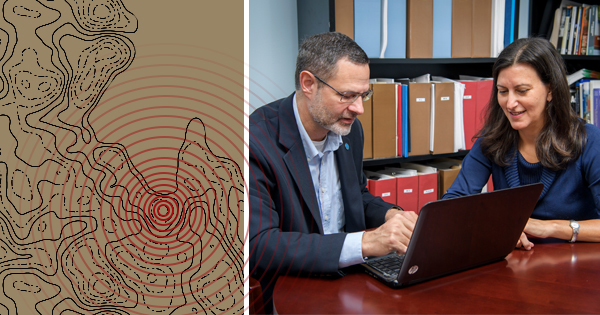


Preparing for the next crisis
Photo by Kathy Atkinson | Illustration by Joy Smoker October 30, 2017
UD research team receives grant to study power outages, water shortages after natural disasters
After hurricanes Harvey, Irma, and Maria, residents of storm-ravaged areas had to stand in long lines for water. Some spent days without power, and many still lack these vital services. These events left many people wondering: Will we be ready when the next crisis happens?
A research team based at the University of Delaware is studying how people adapt to power outages and water shortages after disasters so that policymakers, businesses and individuals can adequately prepare for the future.
Analyzing the damage
A team led by researchers at UD’s Disaster Research Center has received more than $2.5 million for this project under the National Science Foundation’s "CRISP" program, Critical Resilient Interdependent Infrastructure Systems and Processes.
Rachel Davidson, a professor in the Department of Civil and Environmental Engineering, is the project’s principal investigator. Using earthquakes in Los Angeles as a case study, Davidson and the team will study how disasters impact critical infrastructure, how people adapt to the resulting service interruptions, and the implications of those interruptions on daily life. All that information will be used to optimize a broad range of risk management strategies to better meet societal needs. They expect the results to be applicable to other types of disasters, too.
The team’s multifaceted approach will include structural analysis, using engineering modeling techniques to assess factors such as ground motion and physical damage to network components. Davidson has been conducting research on natural disaster risk modeling and civil infrastructure systems for two decades. She is a fellow and past president of the Society for Risk Analysis.
“In the past, infrastructure was designed at the component level, but it’s important to understand how the entire system performs in a disaster,” said Davidson. “Once we understand this, we can optimize how we design and manage future systems.”
The research team, which includes UD’s Disaster Research Center director James M. Kendra, will also utilize social science methods, such as surveys and social media analysis, to assess how people adapt to service outages.
“We’re looking at the users and operators of the infrastructure,” said Kendra. “It’s not just about the power lines; it’s also about the adaptations that occur following outages, and the societal implications of outages.”
Kendra is a professor in the School of Public Policy and Administration and studies individual and organizational responses to risk, improvisation and creativity during crisis, post-disaster shelter and housing, and planning for behavioral health services. He and a small group of colleagues recently met with Facebook CEO Mark Zuckerberg to discuss strategies for disaster response.
The research happening at UD has implications for the rest of the country.
“As a society, we are asking more and more of our infrastructure,” said Davidson. Our increased reliance on electronics—from smartphones to electronic medical records—makes power outages increasingly distressing and even dangerous.
Other collaborators on the project include Linda Nozick and Thomas O’Rourke, both professors of civil and environmental engineering at Cornell University, Bradley Ewing, a professor of energy economics at Texas Tech University, and Kate Starbird, an assistant professor of human centered design and engineering at the University of Washington.
Undergraduate and graduate research assistants and post-doctoral researchers will also participate in all aspects of this project.
“That’s a hallmark of the work we do here at the Disaster Research Center,” said Kendra.
The project will fund summer internships for participants in the Bill Anderson Fund, a fund housed at UD that supports underrepresented students in disaster research.
Contact Us
Have a UDaily story idea?
Contact us at ocm@udel.edu
Members of the press
Contact us at 302-831-NEWS or visit the Media Relations website

